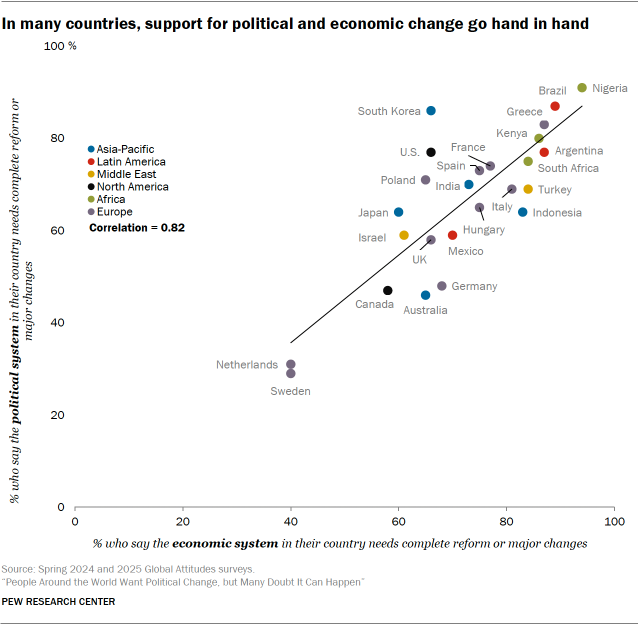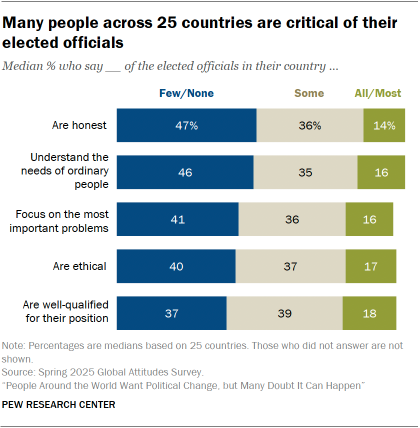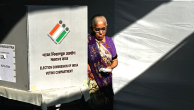
People in regions across the globe are unhappy with their political systems and elected officials, according to a Pew Research Center survey in 25 countries. Majorities in 20 of the 25 countries say their political system needs either major changes or complete reform, with roughly eight-in-ten adults or more holding this view in Argentina, Brazil, Greece, Kenya, Nigeria, South Korea and the United States.
However, many of those who want significant political change in their country are not confident it can happen.
The discontent is, at least in part, tied to frustration with political leaders. Median shares of roughly four-in-ten or more across the 25 countries say that few or none of their elected officials are honest, ethical, well-qualified, understanding of ordinary people’s needs or focused on the country’s most important problems.
Attitudes toward political change
In 12 countries, roughly four-in-ten adults or more express a strong desire for change, alongside skepticism that their political system can change.
For example, 68% of Greeks want complete reform or major changes to their political system but are not confident effective change is possible, while 15% want significant change and do think this is possible. Just 17% say their political system needs minor changes or no change at all.
People who want change but lack confidence that it is possible are often relatively negative about the state of their country and its elected officials. They are particularly unlikely to associate positive traits with elected officials, to feel satisfied with the way their democracy is working or to describe their nation’s economic situation as good.
This group is also especially likely to have negative views of both the main governing party and the leading opposition party in their country. For more on views of parties, read “How people in 24 countries feel about their political parties.”
In contrast, there are seven nations where about four-in-ten adults or more believe their political system needs only minor changes or no change at all. Roughly seven-in-ten hold this view in the Netherlands and Sweden.
Jump to Chapter 1 for more on attitudes toward political reform.

Links between views on political and economic change
We surveyed the same 25 countries last year and included a similar question about the need for economic change. In many nations where support for major economic changes or complete reform was widespread in 2024, there is strong demand for political change now.

For example, 94% of Nigerians wanted major changes or complete reform for their economic system in 2024, and 91% want this for their political system today. In contrast, 40% of Swedes thought their country’s economic system needed significant changes last year, and just 29% feel this way about their political system in 2025.
What do people think about elected officials?
Respondents were given a list of five positive characteristics and asked whether they describe elected officials in their country. Political leaders receive mixed assessments on these measures at best and get decidedly negative marks in a number of places.

Across the 25 nations polled, a 47% median say few or none of their elected officials are honest, 36% believe some are, and just 14% think all or most can be described this way.
A 46% median say few or none understand the needs of ordinary people. And around four-in-ten believe few or no elected officials are focused on their country’s most important problems, ethical or well-qualified for their position.
People in Greece, Italy, Spain, Turkey and the U.S. tend to stand out for their negative assessments of politicians, as do those in the African and Latin American countries surveyed. By contrast, people in Canada, India, Japan, the Netherlands and Sweden are generally less critical of their elected leaders.
These findings are consistent with Pew Research Center’s previous international polling. Our 2023 survey found widespread belief that political leaders do not care what ordinary citizens think, as well as support for changes to the types of people elected to public office. And when we asked people what would improve the way democracy works in their country, the most common response was putting better or different politicians in office.
Jump to Chapter 2 for more on views of elected officials.
Views among young people
In general, there are relatively few demographic differences across the questions in this report. However, younger adults stand out in some interesting ways.
- In nine countries, the desire for significant political change is higher among young adults than among older adults. For example, 54% of Canadians ages 18 to 34, compared with 39% of those ages 50 and older, say their political system needs major changes or complete reform. In Germany and the Netherlands, however, those ages 50 and older are more likely to say this than their younger counterparts.
- In 11 countries, younger people are more likely to think few or none of their elected officials are honest.
- Younger adults in France and the U.S. view elected officials in an especially poor light. They are more likely than older adults to say few or no elected leaders have each of the five positive traits we asked about.





